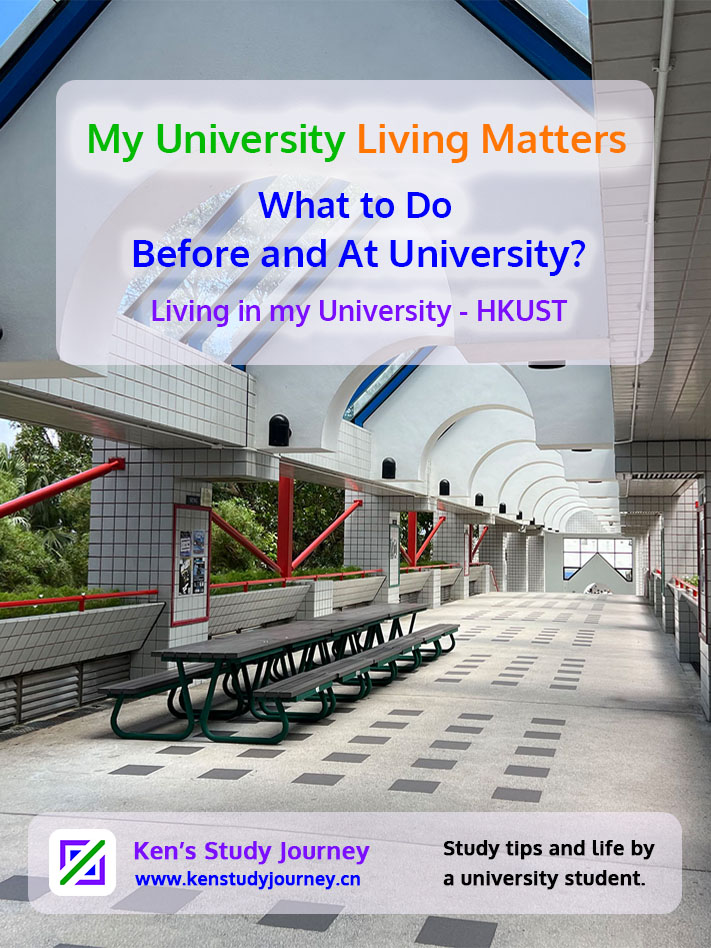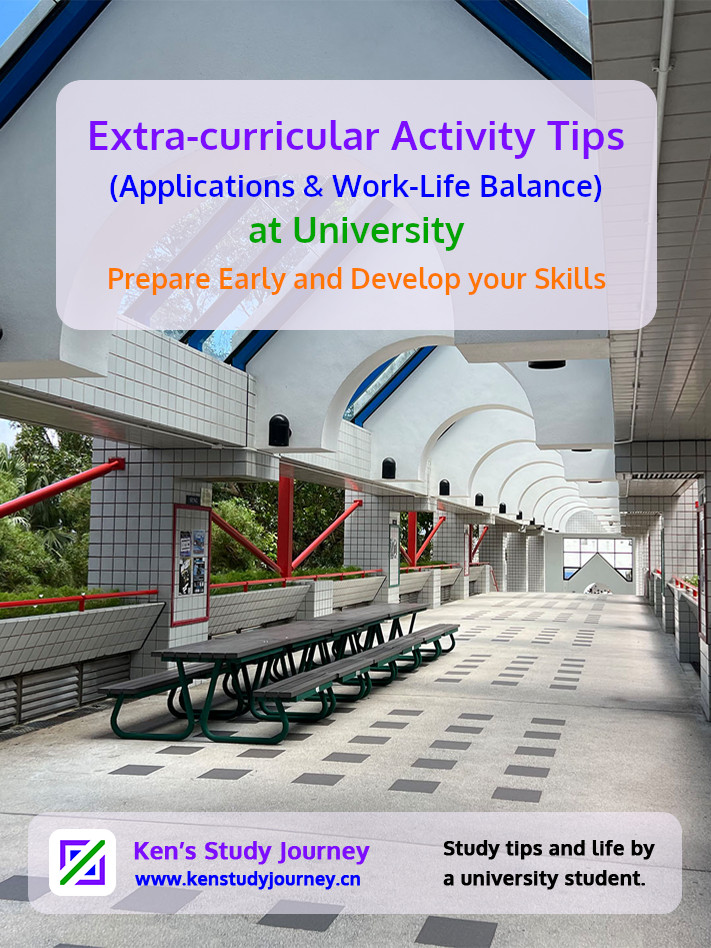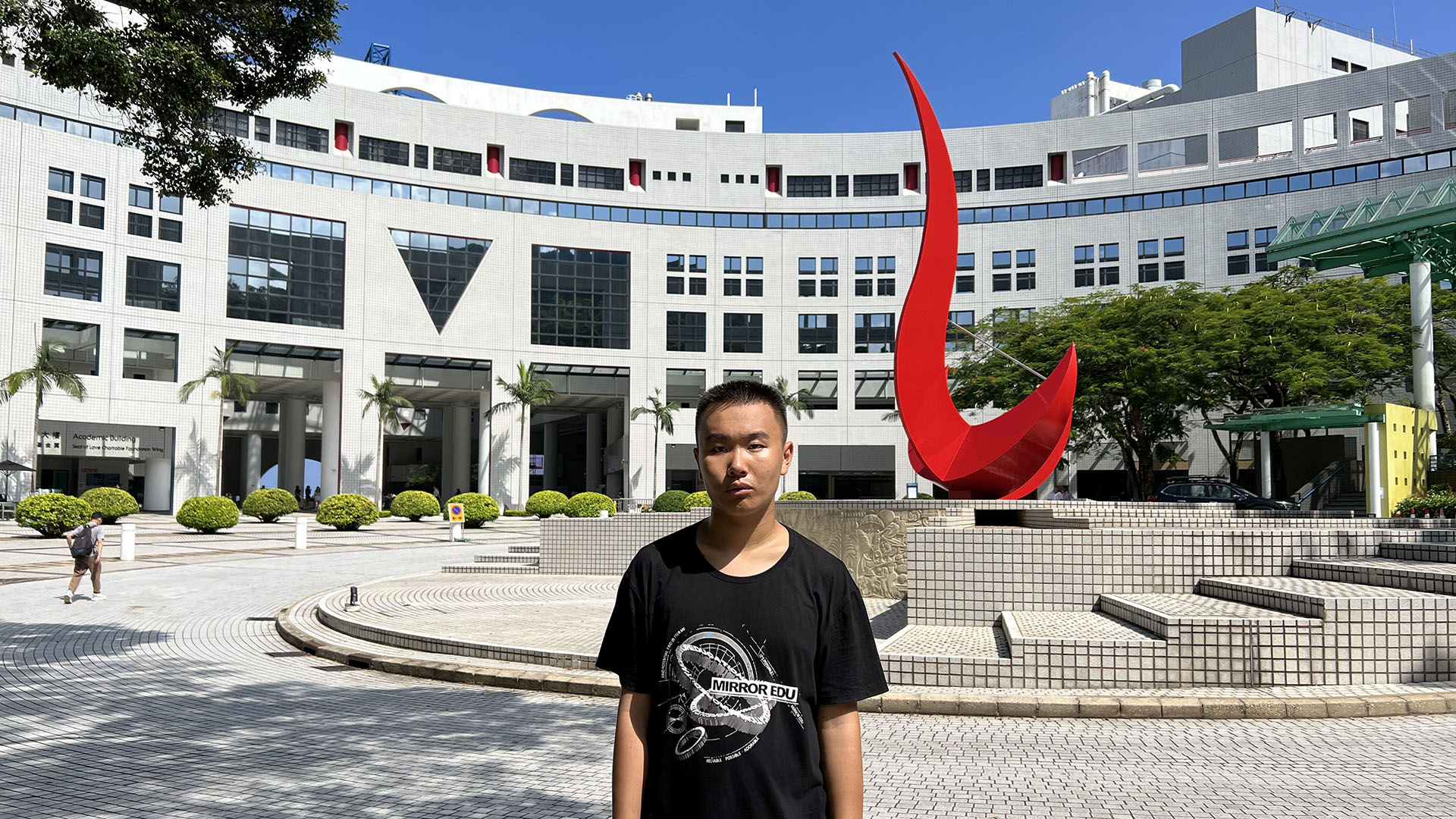At university, we have not only academics🎓 but extra-curricular activities🎨. We need to have a work-life balance⚖️ between them for better performance.
Most extra-curricular opportunities look at our past experiences📄, personal and interpersonal skills💬.
Rather than applying to as many activities as possible, I focus on very few activities and duties.
In this article, I will explain how I achieve my work-life balance⚖️ with outstanding results🏅 on both sides, plus my experiences and tips💡 for extra-curricular activities.
University Life Sharing
On 27 Aug. 2024 (in Guangzhou; several days before my university Hall check-in time), as invited by my high school🏫 homeroom teacher, I shared my university life🧑🏫 to future high school students (in Putonghua) online🌎.
In this lecture, I shared:
Our university has many extra-curricular opportunities🥳, but most of them look at your previous experiences. As a high school student, you should prepare early and develop your personal skills.
The application📥 of them might be tough and very similar to top university applications (e.g., Oxford, Cambridge) with Admission Tests and/or Interviews.
There are limited attempts in the university homework. Many students were afraid to click the "Submit" button with a sense of humour.
"❌ Incorrect. Try Again. 5 Attempts Remaining."
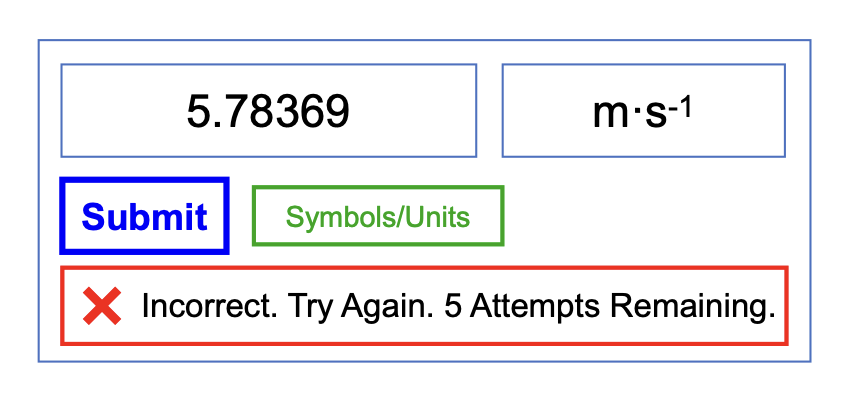
Limited Attempts for University Homework
My Extra-curricular Activities
- (2021) Inspector of Disciplines (Co-leader)
- (2023) USThing App (App Team) (Leader (one of))
- (2024) ITSC Student Intern/Helper (Member)
- Ken's Study Journey Website
(2021) Inspector of Disciplines
Back to my high school🏫 studying A Level, I became an inspector🔍📋 (co-leader) checking whether students violated our school rules (like wearing earrings💍).
Speaking in front of around 300 students in a Lecture Theatre🧑🏫, I shared my past experiences in managing my Hall room🛏️.
I didn’t study well❌ in the past, but I realised✅ the importance of studying and following rules📄 and overtook🔝 many other students in Form 3 (Year 9).
I always turn off the lights💡 in the dorm and ask📣 my roommates to sleep🛌 exactly at 22:30⏰ regardless of whether teachers come.
I also warn⚠️ my roommates who talk loudly💬 after this time and even report⛳️ to my homeroom teacher to make sure I have energy🌟 on the next day.
— from My Words in the Election Speech
Our university Halls (dormitories) don't❌ force us to turn off lights after a specific time.
In our high school Halls, however, we must turn off lights🛋️, keep quiet and go to sleep🛌 at 10:30 pm.
Followed by the majority votes📊, my name was shown on the result board meaning my application was successful✅.
Our inspectors have the following weekly duties checking among different classes:
- Monday at 7:15 am: checking whether students are late⌛️ or not wear the correct uniform🤵 in Flag-Raising Ceremony
- Monday to Wednesday evening: checking student's appearance (random inspection⚠️; e.g., earrings💍 not allowed)
- Thursday at 9:50 pm: checking classroom hygiene✨ after full-classroom cleanup🧹 (at 9:30 pm; e.g., desks/chairs🪑 must be tidy)
(2023) USThing App (App Team)
Right at the start of my university Year 1 journey🚝 (Sep. 2023), a recruitment email📩 from the university app team, USThing, grabbed my attention.
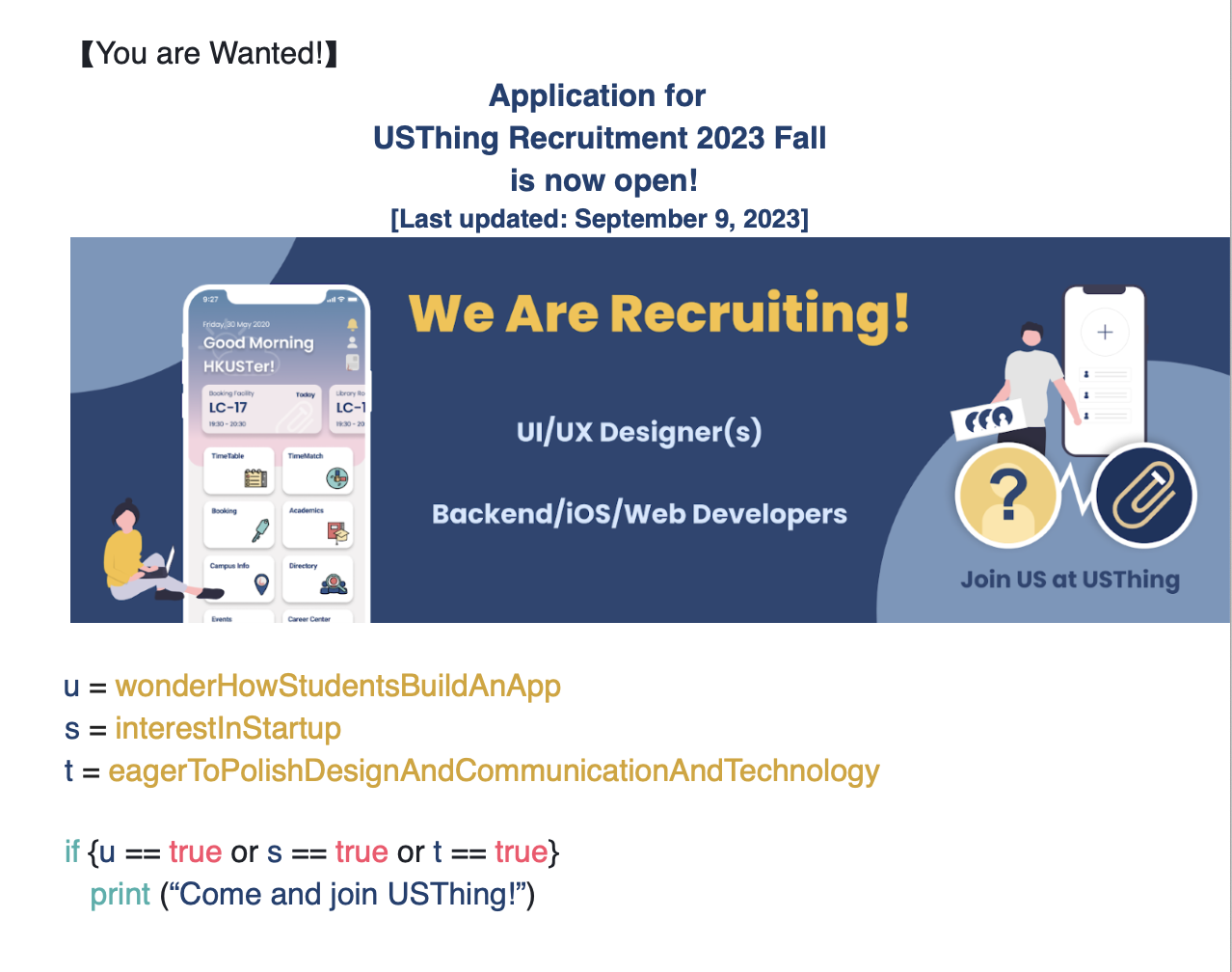
USThing Recruitment Email (2023-24 Fall)
Having been doing my personal project (this Ken's Study Journey website) plus some relevant internship, I was shortlisted✅ for both Technical Test (4 hours) and Interview.
"Congratulations! You are now part of USThing!"
After opening my email inbox📨, I was more than surprised🌟 for joining the development team.
During my Year 1 journey, I successfully fixed🛠️ a number of bugs🐞.
At May 2024, I was selected as one of the team leaders🤵 (formally and officially Core Members).
This summer, we were extremely busy😰 re-designing and revamping🎨 our app with major updates. I was more than happy😀 enhancing the living experience of students.
Official Website: usthing.xyz
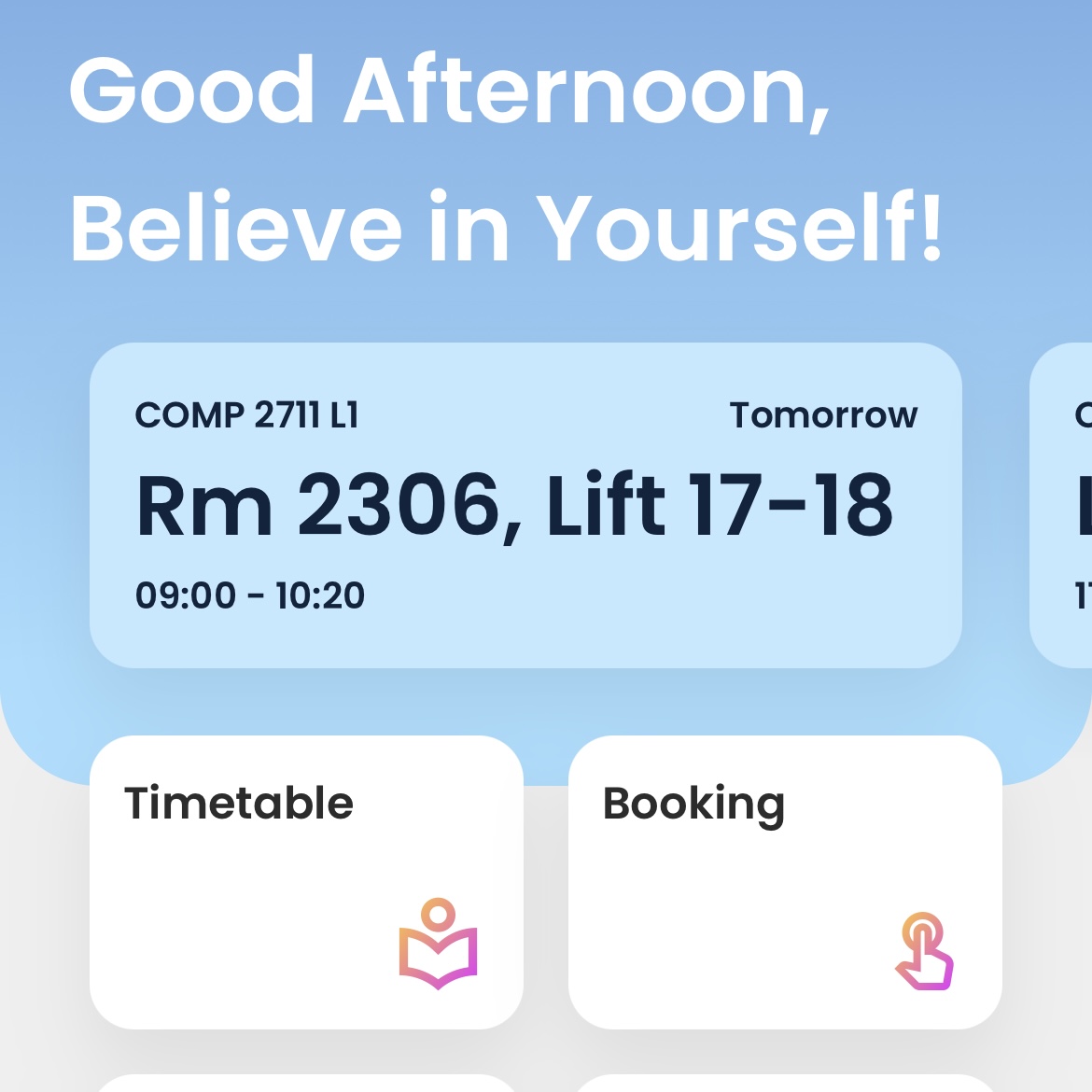
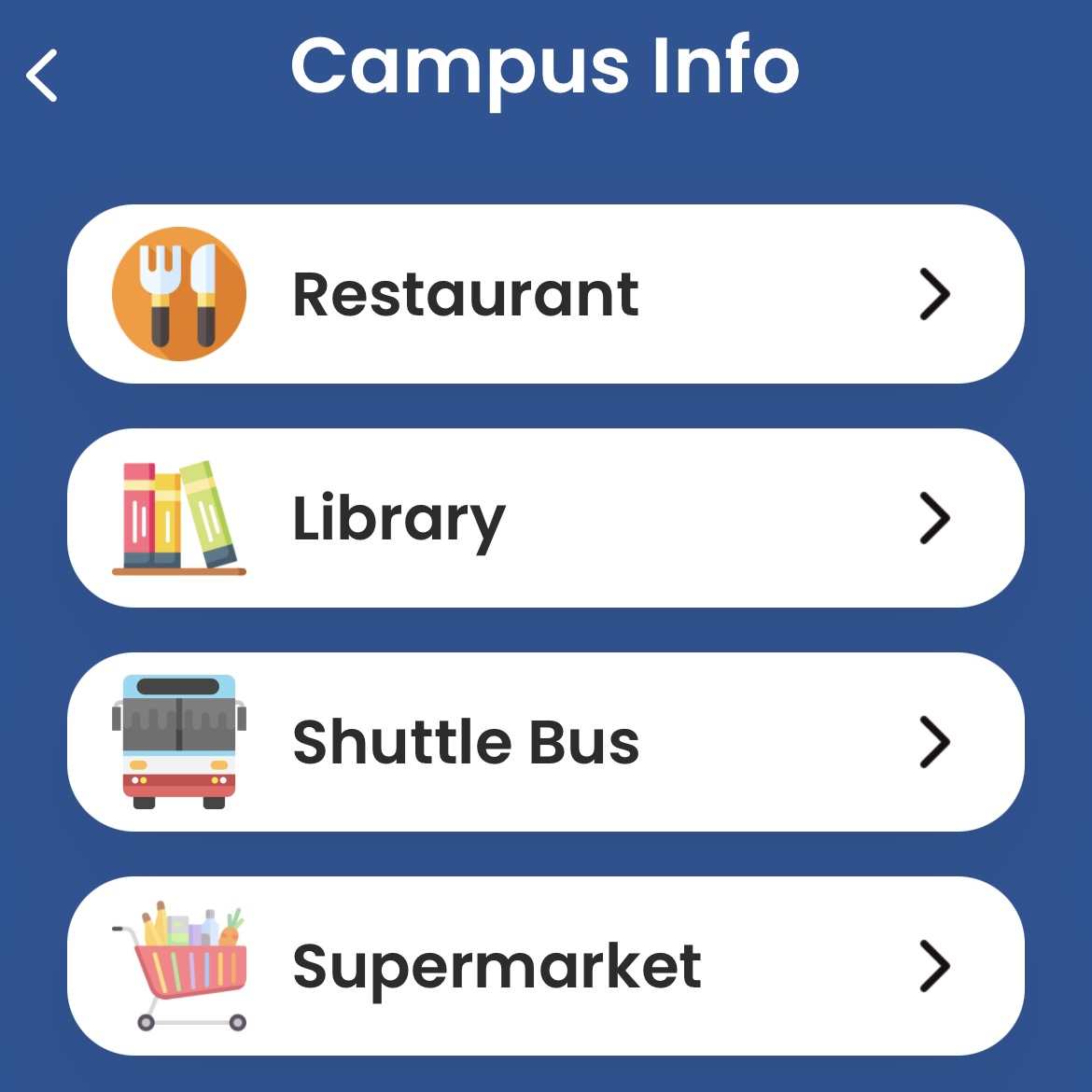
New USThing App Screens
(2024) ITSC Student Intern/Helper
At the end of May 2024, I found another opportunity matching my interests and skills - ITSC Student Internship💸 (also known as ITSC Student Helper🙋).
Note: ITSC is shorted by Information Technology Service Center (an IT department)
Our ITSC Student Helpers have the following duties:
- Refilling Papers📄 and Toners🗃️ in Printers
- Checking Computer Barn (Room/Lab) Conditions (including tidying up✨ desk/chair)
- Checking Classroom Equipment📹🎤 (7 pm to 9 pm)
- Answering Questions🙋 from Users (e.g., Students and Staff)
- Fixing or Reporting Faulty🚧 Equipment
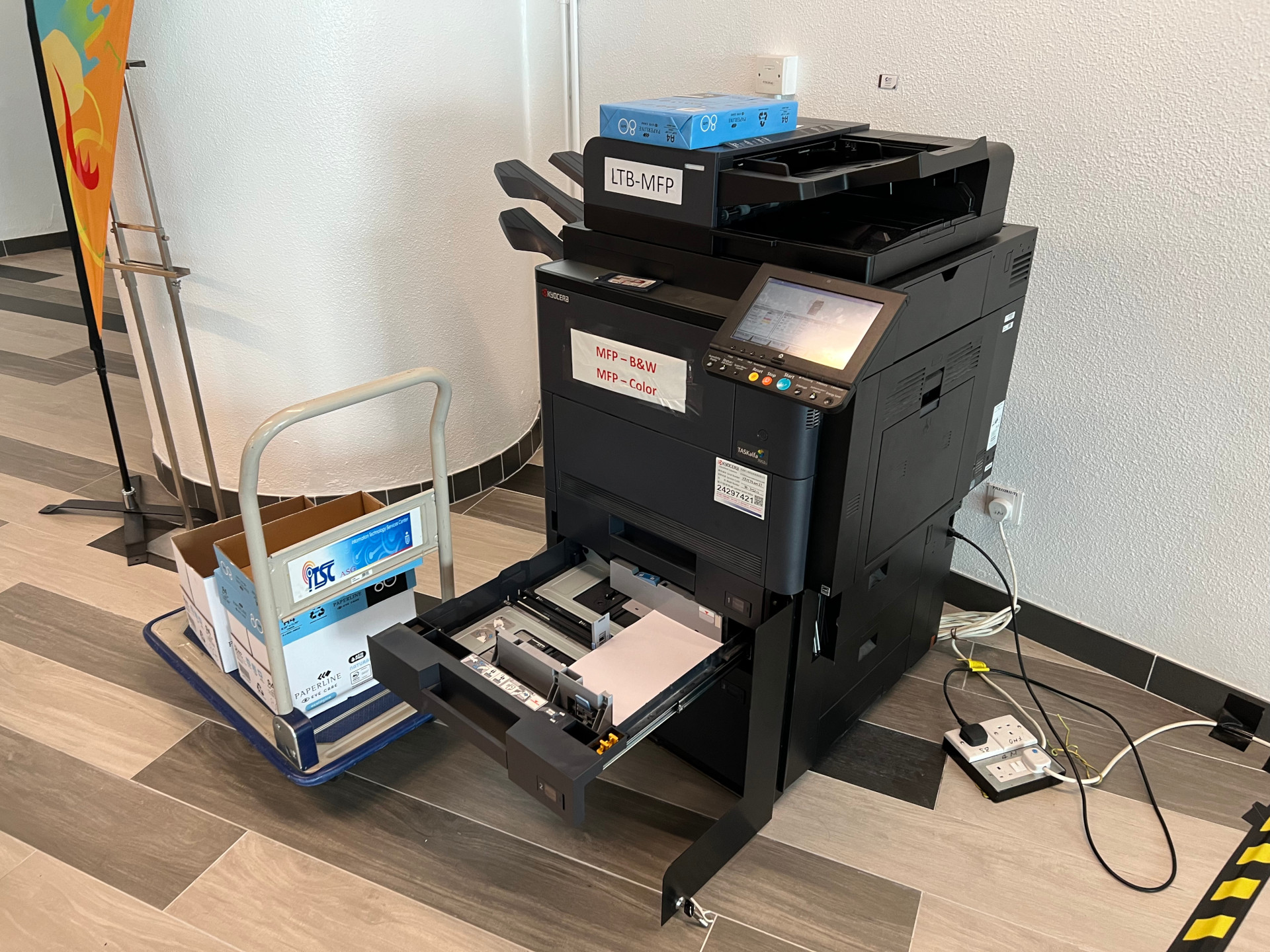
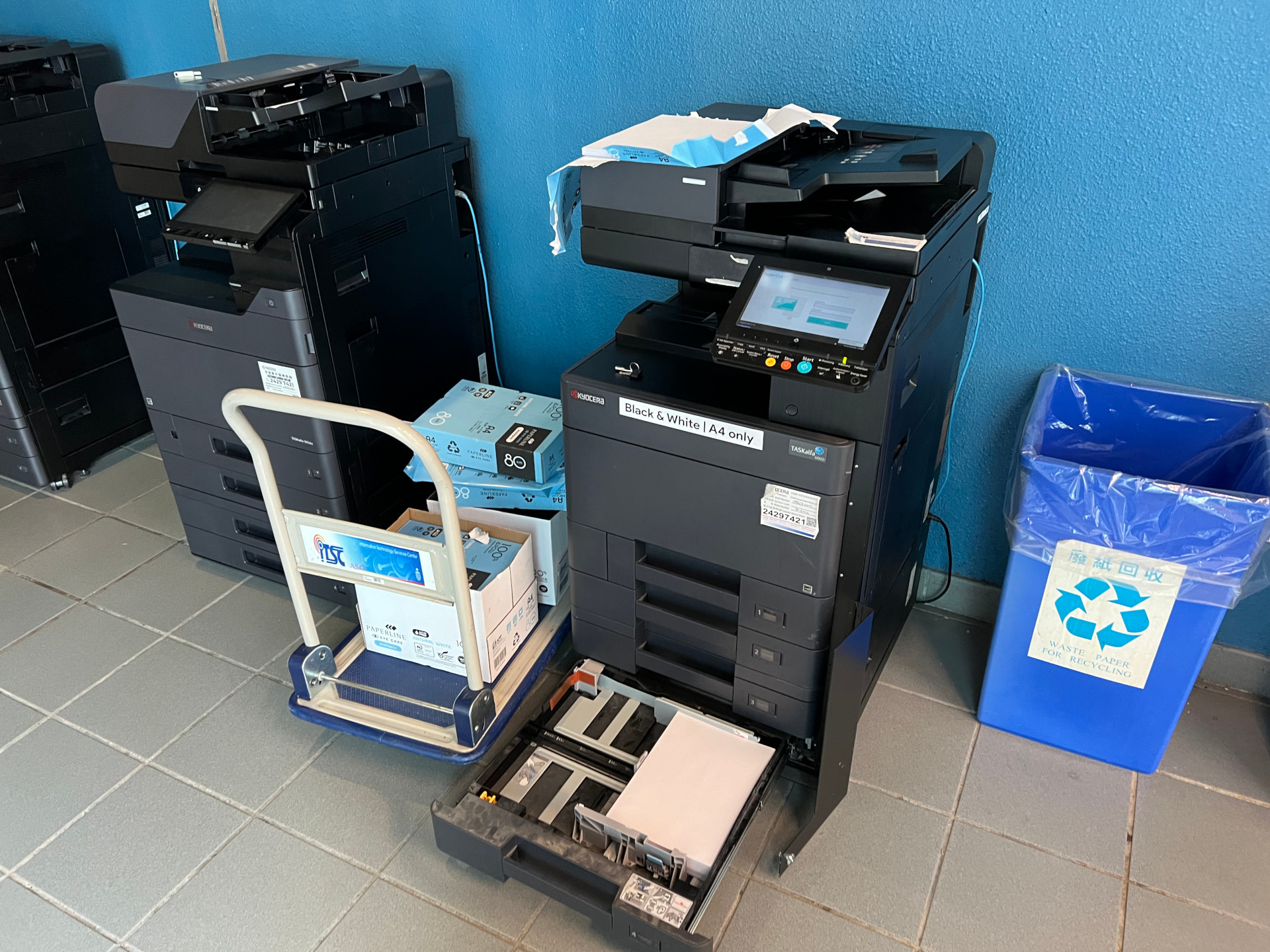
Adding Papers to Printers (LTB (1) and LTD (3))
In our student group, someone asked a question:
"How can I change my university email password🔐?" (originally in Chinese: “提问大学邮箱怎么改密码?”)
Being a helpful person, even not at the Help Desk, I was the first to answer this question:
- "You can change it on the ITSC website."
- "As an ITSC Student Helper, I know the relevant information."
We also check for and stop✋ some violations⚠️ when using university IT services, including:
- Eating, Drinking🍔🥤 or Speaking Very Loudly🗣️ in Computer Barn
- Leaving Items🎒📚💻 Unattended (i.e., putting items on desks/chairs while leaving the seat) in Computer Barn
- Stealing Papers📄 Directly from the Printers'🖨️ Paper Tray📤 (usually locked🔒)
For example, we put a Warning⚠️ label on the desk with unattended items during our random inspections🔍.
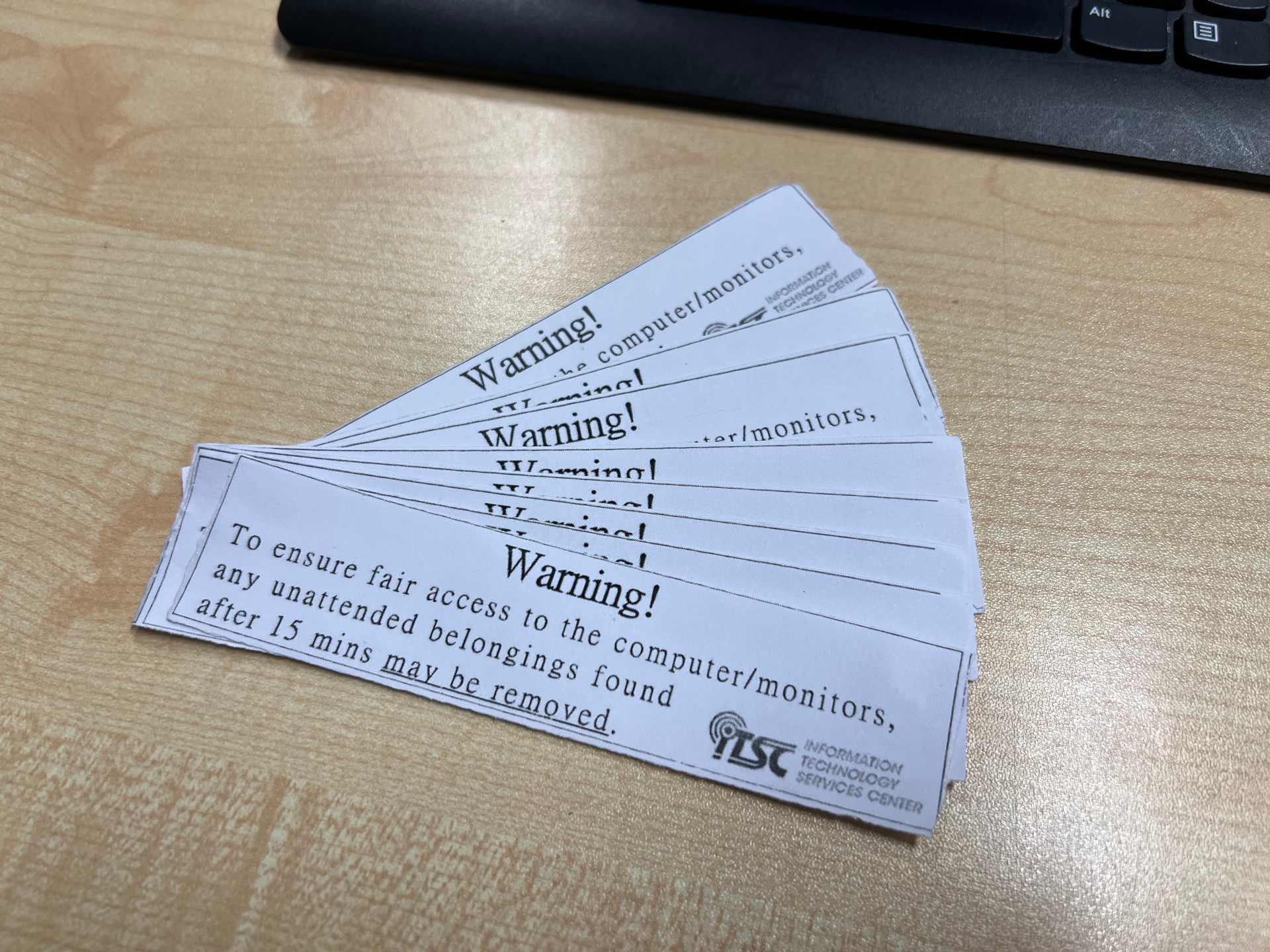
Computer Barn Unattended Item Warning Label
Similarly, in our university library📚, we can usually see the "NO SEAT RESERVATION" (in full capital letters) warning⚠️ label on the desk with unattended items.
Also, we usually (randomly) hear this announcement📣 when taking MTR (Metro)🚇:
"Your attention please! Eating or drinking🍔🥤 is not allowed🚫 on trains or in the paid areas of stations."
Apart from stopping violations, I successfully helped🙋 many students with Student Cards Update🪪 and University Printers🖨️.
Ken's Study Journey Website
Since 2019 (back to my middle school🏫), I started the Ken's Study Journey website project.
Becoming my biggest personal project, I developed a range of skills in my free time, from Web and Backend Development🛠️, UI/UX and Image Design🎨, Content Sharing to Technical Research🔬.
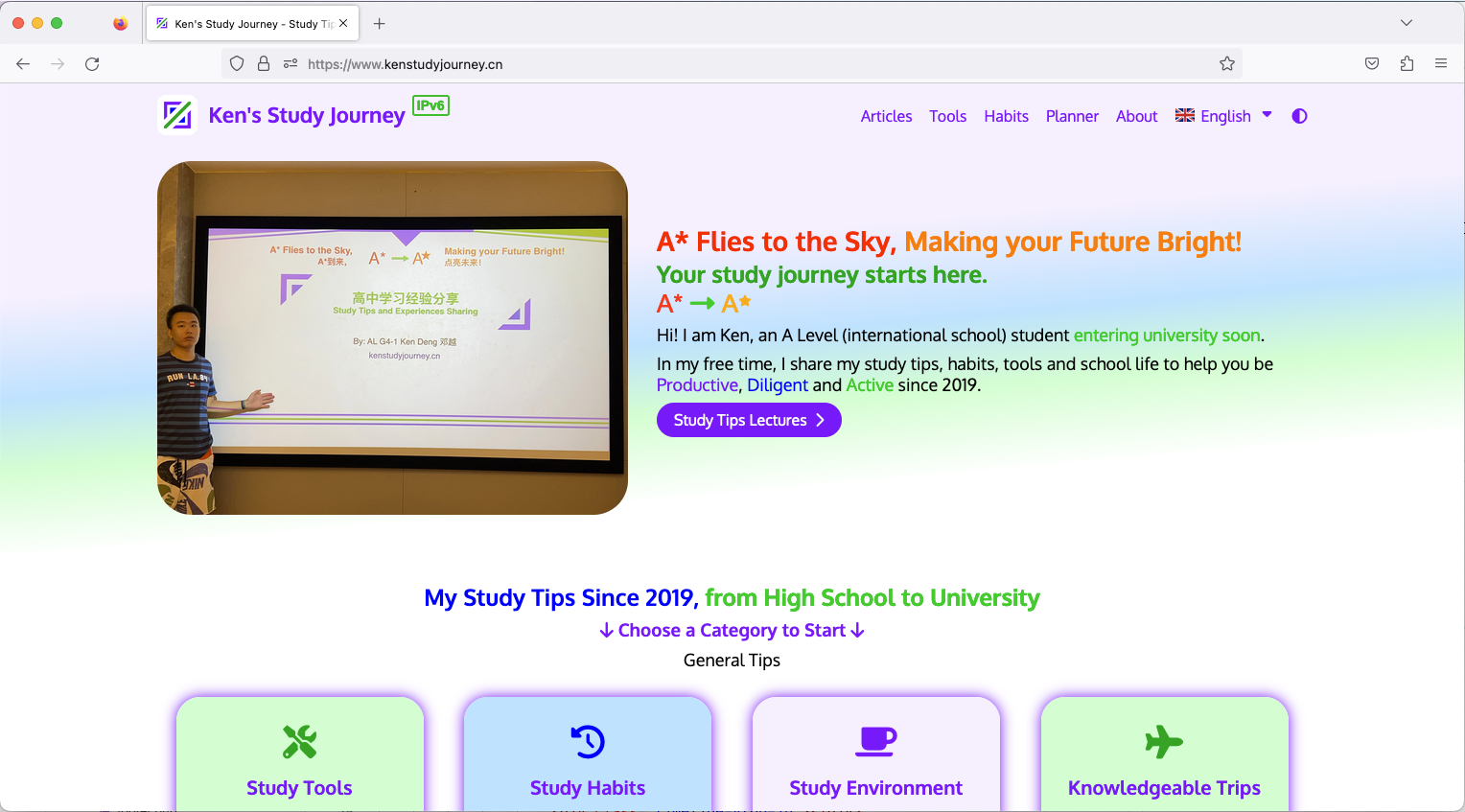
Ken's Study Journey Website Home Page (2023)
As stated at the top of the website home page, it will continue thought my university journey.
Apart from the main website, I also developed my online planning🗓️ tool, Ken's Study Planner managing my deadlines in one place.
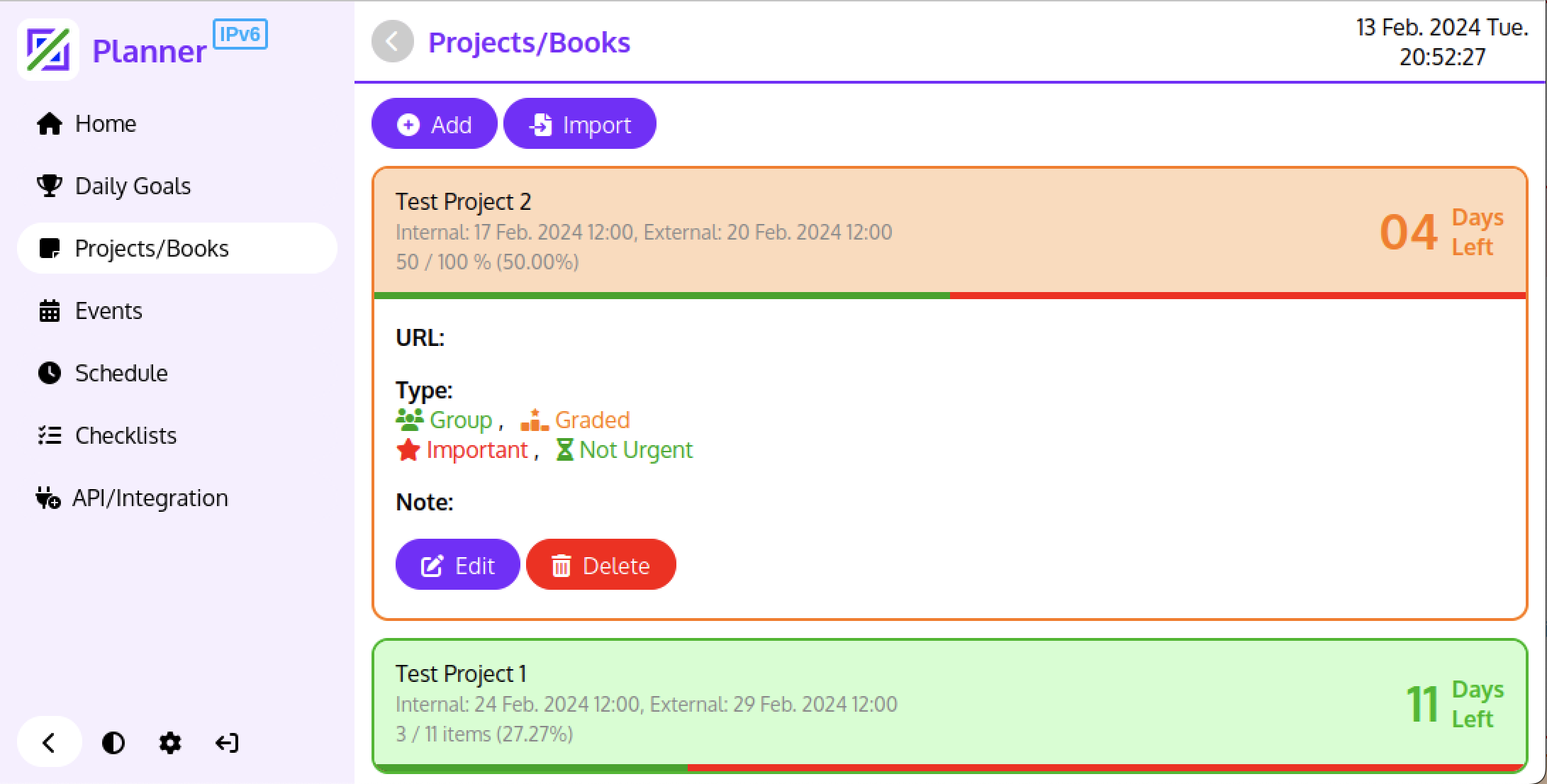
Ken's Study Planner New Interface (2024)
Application Process
But applying to and joining activities is not an easy task! Most of them look at our past experiences and passions as stated in the CVs📄 and/or application forms.
Some activities also have assessments for skills, including interviews💬 and/or admission tests✍️.
In this section, I will briefly explain each step commonly seen in our applications.
CV and Application Form
The first step usually involves a CV and/or an Application Form filling in our self-introduction and past experiences.
Many opportunities look at similar past experiences, interests and passions as their first impression.
A CV (resumé) usually includes:
- Personal Introduction & Contacts
- Work Experiences (including Internships and Personal Projects)
- Education History
- Skills & Hobbies
- Personalities
While we usually need to fill in an application form📄 to apply, some companies and groups require applicants to directly send/upload a CV📄 (usually by email📩).
Admission Test
Similar to applications to some top school and universities, there may be admission tests📝 in a few opportunities at our university.
This usually tests your technical and problem-solving skills.
During my USThing application journey (2023), everyone was required to take a Technical Test for 4 hours⏳.
This tested our skills in web/app development🛠️ and problem-solving.
Interview
A major sources of companies, groups, societies and departments usually involve interview💬 in the admission process to select candidates.
Depending on each position and skills to be tested, it may be individual or group interviews.
The interviewers may ask questions about, including but not limited to:
- what you filled in your application form or CV📄 (e.g., your experiences);
- the school, company or group itself🏢 (testing your understanding);
- your passion🌟 to the job (e.g., "Why do you want to apply to ...?");
- and sometimes solving problems🛠️.
Just be yourself, answer questions and show your passion based on your actual past experiences and thinking during the interview.
Application Results
"Thanks for your application to ... . After carefully considering your application, we regret to inform you that your application is unsuccessful."
Many students probably see this after the applications.
But Don't Panic!
It's bringing you energy and motivation🌟 for your future study and work. There will always be opportunities suit your interests.
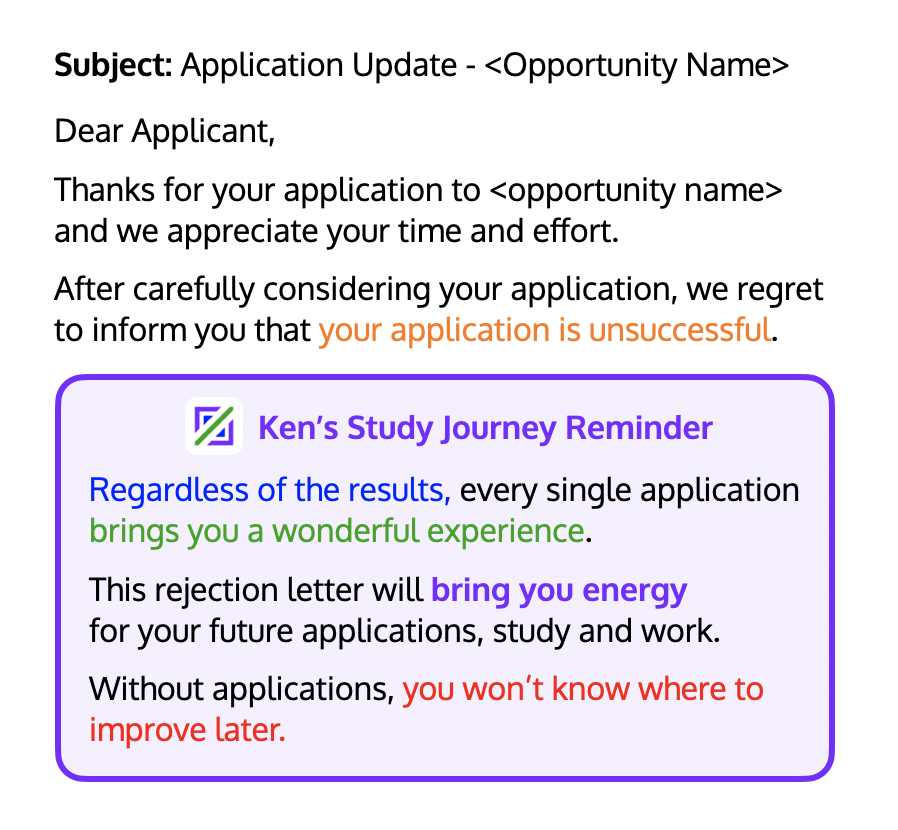
Example of Rejection Letters
If you get a rejection letter (or sometimes no response), you can improve yourself based on different cases.
Making analysis📊 on each failure (whether in applications, academics📝 or experiments🔬) is always useful for your future improvements.
| Case | My Suggestion |
|---|---|
| After Sending Application Form or CV | You probably failed the background check, but you can gain more similar experiences in your future study and work. |
| After Admission Test | You can learn from the test/interview itself. Based on the questions, you can do more practice. |
| After Interview |
If you get an offer (Congratulations! 🎉), however, it indicates you already have the skills necessary for the job.
I usually say: "Regardless of the results, every single application brings you a wonderful experience."
Without applications, you will know neither whether successful or not nor where to improve in the future.
Skills Tested
At this point, followed by a tough😰 application workflow, you probably want to learn more about what skills🤔 are being tested in the applications.
Different activities may test your different skills at different levels, including but not limited to:
- Leadership 🤵
- Event Organisation 🗓️
- Communication 💬
- Collaboration / Team Work
- Group Discussion 💬
- Team Building 🏗️
- Helping/Caring People (Customer Service) 🤝
- Public Speaking 🎙️
- (Web/App/Backend) Programming 🧑💻
- Image/Video Editing 🎥
- Office Software (e.g., Word, PowerPoint and Excel) 📄📊
- Academic Achievements 💯
- Self- and Time-management ⏳
- Language Proficiency💬 (Speaking and Writing) (e.g., English, Chinese (中文), Putonghua (普通话))
While we may not need Chinese skills (majorly in English) in academics📝 at our university, some extra-curricular activities and opportunities may still require it (usually for serving more people).
For example, according to some job descriptions📄: "Good commands in (written and spoken) English and Chinese"
My Tips & Advice
Now, I will share my useful tips💡 and advice, some of which are already mentioned in my PPT (Chinese version) at the top⬆️ of this article.
Work-Life Balance
While we mainly need to focus on academics, we can have some extra-curricular activities.
However, Work-Life Balance plays a key role in our school and university campus🏫 life, or it may negative impact⚠️ our academics.
Utilising my self-developed Ken's Study Planner system, I set internal deadlines for each task (refer to the image below⬇️).
Apart from internal deadlines, I also use a methodology invented during my high-school journey: Separative Study System, where I:
- do academic tasks on weekdays
- only do non-academic tasks (including university societies/groups, like USThing) at weekends and holidays (unless there are urgent academic tasks)
A major source of students, without motivation in academics, usually leave many tasks until deadlines (due dates). (we usually call it "赶due" in Chinese)
This will not only increase our burden😰 but lower the quality of our work.
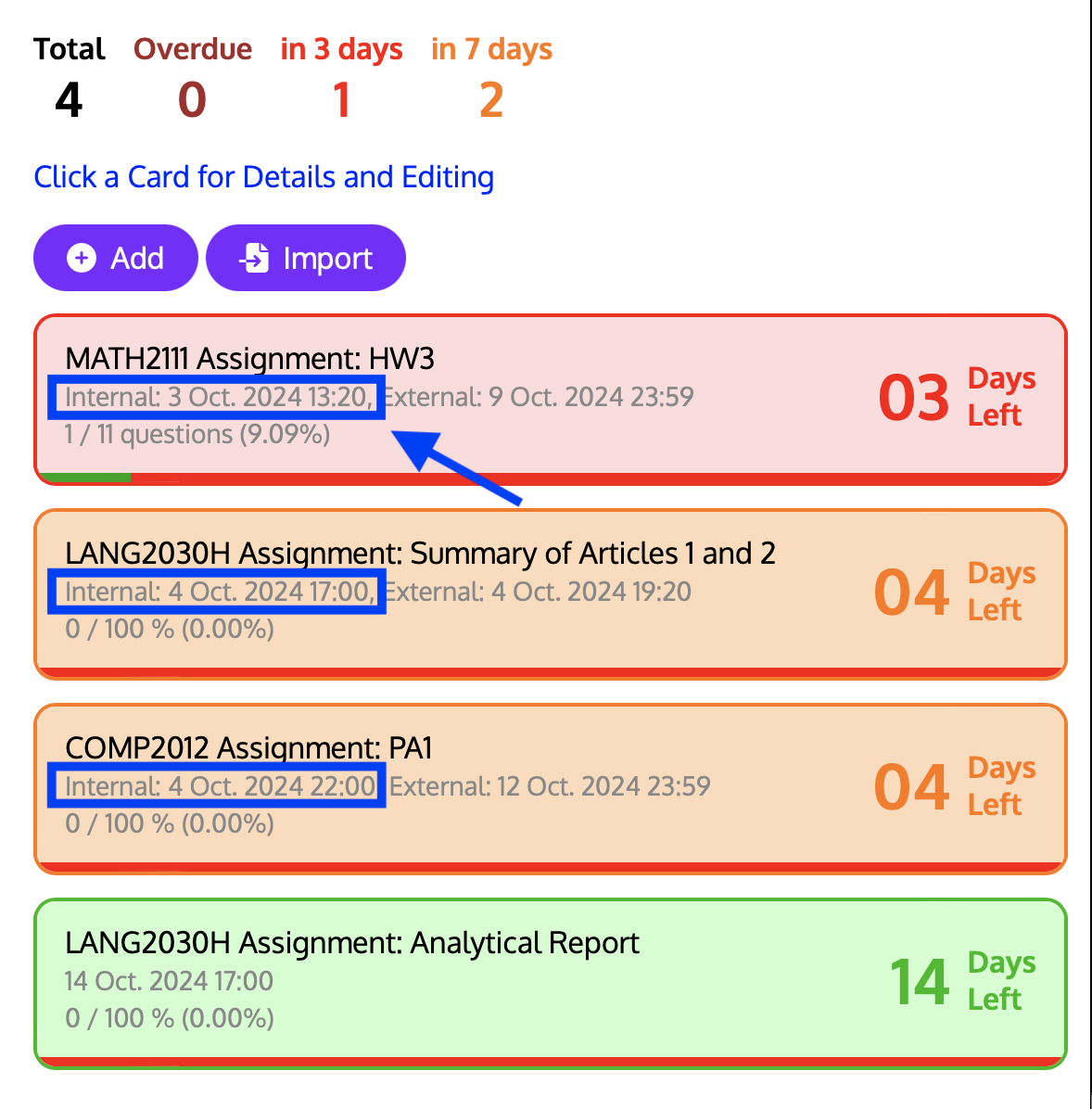
Setting Internal Deadlines
Free Time
So, what can you do in your free time?
Well, you can prepare early and develop the skills (as listed above⬆️) suit you in your free time.
Back to my high school🏫, I developed a range of skills:
- Leadership 🤵
- Public Speaking 🎙️
- Web and Backend Programming 🧑💻
- Image/Video Editing 🎥
- Academic Achievements 💯
- Self- and Time-management ⏳
- Language 💬 (English and Chinese)
Apart from the Ken's Study Journey/Planner personal project, I also developed them by the EPQ Project (A*; 27/28), Student Union Election Speaking and Work, Study Tips Sharing Lectures, etc.
Applications
You can find and apply to those align with your interests and skills from emails, posters on notice boards, and so on.
Regardless of whether successful or not, always try your best to apply and you will probably find it successful✅ in at least one of them.
More importantly, you need to show your interests and passion in your applicaton forms, CV and interviews.
As stated above⬆️, keep in mind that every rejection letter brings you energy and motivation🌟. Don't panic and you can always improve yourself.
Again, my friendly words:
"Regardless of the results, every single application brings you a wonderful experience."
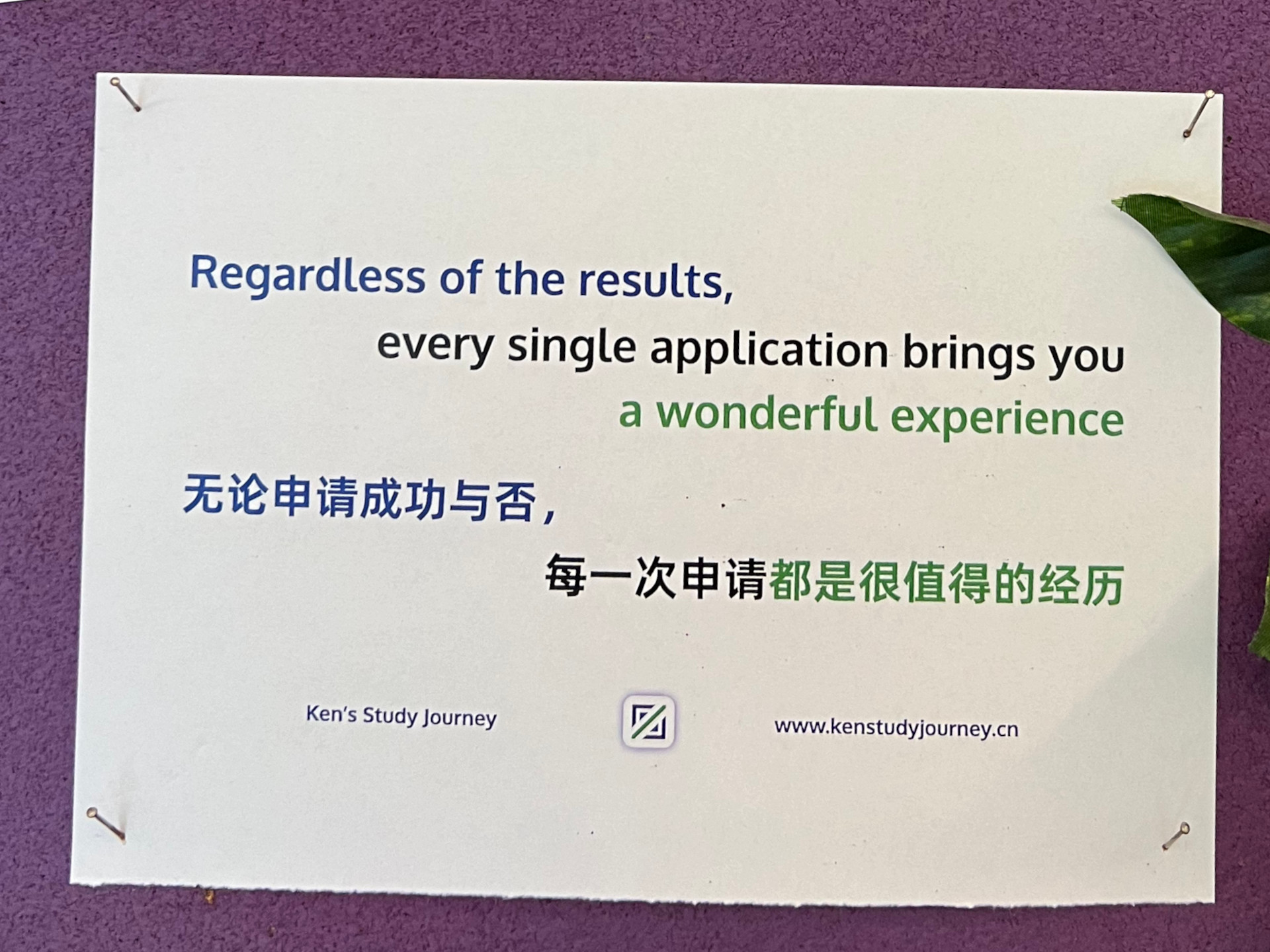
My Friendly Word Board in Applications at Home
Thanks for Reading!
These are my extra-curricular and work-life balance tips💡 during my university journey. Hope you enjoy a productive and fruitful🎨 university life.
More university-related articles may be released later📤. You can subscribe to my Email Newsletter📩 and stay tuned.
More useful study techniques🛠️ and habits📝 are available on my website. You can explore them if you want.


